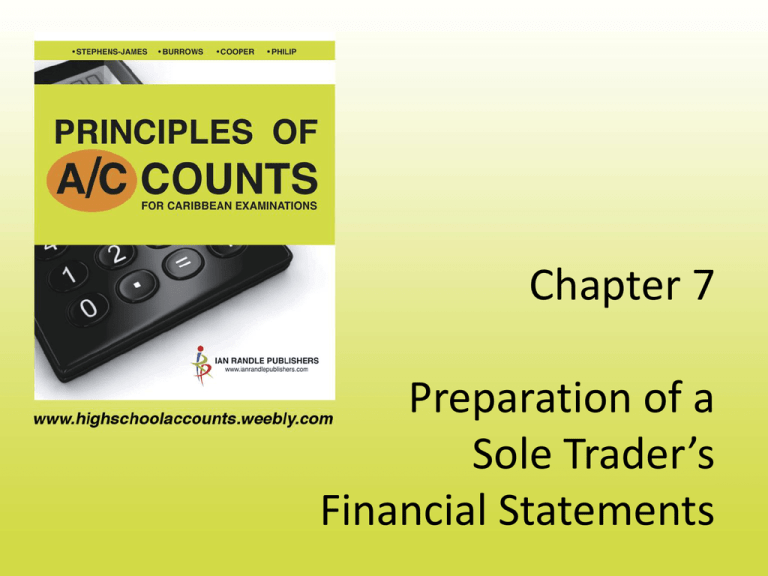Chapter 7 Preparation of a Sole Trader’s Financial Statements
advertisement

Chapter 7 Preparation of a Sole Trader’s Financial Statements Two of the Most Important Financial Statements There are two main reports prepared for sole traders. These are the: • The Income Statement (also called a Trading and Profit and Loss Account) • The Balance Sheet Two of the Most Important Financial Statements An income statement is used to determine whether a firm made a profit or loss for a particular period. The money used up in generating revenue is deducted from money earned. In a balance sheet, the firm presents its assets, liabilities, and capital. It shows the worth of the organisation at a particular point A typical Income Statement A Typical Income Statement: Gross Profit Calculation Gross profit = Net Sales - Cost of sales Net Sales = Sales - returns inwards (goods returned by customers) Cost of Sales = Opening stock + Net purchases -Closing stock Net purchases = Purchases + Carriage inwards (the cost of bringing goods to our premises) - Returns outwards A typical Income Statement: Net Profit Calculation Net profit = Gross profit + Other revenue earned Expenses A typical Balance Sheet A Typical Balance Sheet: Presentation of Working Capital Working Capital= Total Current Assets – Total Current Liabilities Working capital tells the owner the extent to which he can pay amounts due within a few weeks or months. A Typical Balance Sheet: Presentation of Working Capital Current assets $ Inventory 1500 Short term investments 12000 Bank 40000 Cash 500 Current liabilities Bank overdraft 750 53,250 $ 54000 Capital and Revenue Expenditure It is very important to know the difference between capital expenditure and revenue expenditure. Capital expenditure is any spending on fixed assets, whether that is to purchase new fixed assets or to extend fixed asset lives. Revenue expenditure is any spending on goods and services that facilitate daily business operations. Capital and revenue expenditure Capital Expenditure Revenue Expenditure Purchase of motor vehicles Maintenance costs of motor vehicles (e.g. gasoline, oil, minor repairs) Installation of a new engine in a motor vehicle Costs of changing spark plugs Purchase of new computers Costs of cleaning computers Testing and installation of new computers Costs of regular testing and maintenance of computers Purchase of a warehouse to be used for the storage of computers in a firm that sells computers N.B. This will apply to manufacturers and retailers of computers. Purchase of computers for sale to customers. N.B. This will apply to retailers of computers. Acquisition cost of land Regular cutting and clearing of grass on acquired land Purchase of new building Electricity, water, and telephone rates; regular cleaning, repairs and painting of a building
